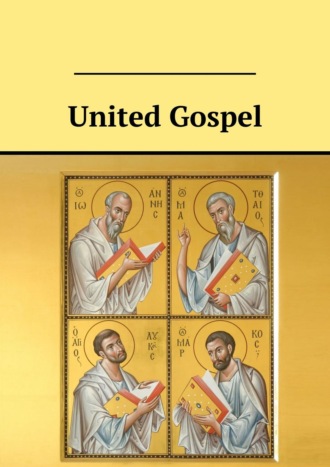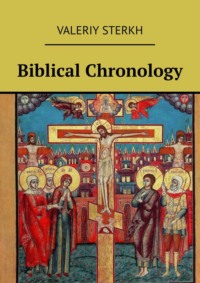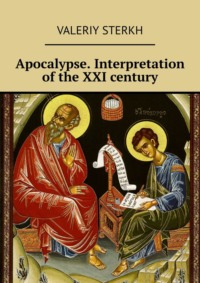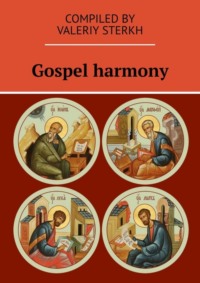
Полная версия
United Gospel

United Gospel
Valeriy Sterkh Translator
Valeriy Sterkh Составитель
© Valeriy Sterkh, translation, 2021
ISBN 978-5-4490-1446-7
Created with Ridero smart publishing system
Author’s note
This work is an experiment in connecting the four canonical Gospels into one narrative. The content of the work consists only of words and phrases found in the four Gospels; consequently the resulting text is entirely assembled from the canonical Gospels of Matthew, Mark, Luke and John. Hence its name: “United Gospel”. As a source material, we have used the King James Version of the Bible. In some cases, explanatory words were added for clarity, even though they are not found in the King James Version; such words are in brackets.
To align the four Gospels, the tables of synoptic parallels were used. The alignment was based on the Gospel Synopsis from the Orthodox Bible, which reproduces a related publication of the Moscow Patriarchate (Bible. Moscow: Russian Bible Society, 2000) In some cases, the comparison was made based the table borrowed from the Belgian edition of the Holy Scriptures (Bible. Brussels: Life with God, 1983). It is worth noting that, for the goals mentioned above, none of the two tables were acceptable “as is”, for a number of reasons. In this respect, the interpretation of the Gospel narrative about the resurrection of Jesus Christ proved to be the most critical. To solve the apparent conflict, we have used the sequence from the Harmony of the Gospels, quoted in Seraphim Slobodsky’s “The Law of God” (“The Law of God for Families and Schools”. Jordanville: Holy Trinity Monastery, 1967). Based on the analysis of the above mentioned sources, a new table of synoptic parallels was created according to which the following “United Gospel” was drafted.
While working on the “United Gospel”, the issue of chronology was something we could not ignore. This meant not only determining the order of certain events but also their dating. To solve problem with a satisfactory result, we had to made chonological calculations all over again. Such a complex approach to dating of the Gospel events also helped to clarify a number of theological issues and resolve certain problems related to the New Testament Bible studies. For instance, it was clearly seen that Lk 6:1 talks about Pentecost, not Easter.
The above mentioned calculations with commentaries can be found in my book “Biblical Chronology”.
United Gospel
UG 1. Prologue (Mk 1:1; Lk 1:1—4; Jn 1:1—18)
1:1 Forasmuch as many have taken in hand to set forth in order a declaration of those things which are most surely believed among us, (Lk 1:1)
1:2 Even as they delivered them unto us, which from the beginning were eyewitnesses, and ministers of the word; (Lk 1:2)
1:3 It seemed good to me also, having had perfect understanding of all things from the very first, to write unto thee in order, most excellent Theophilus, (Lk 1:3)
1:4 That thou mightest know the certainty of those things, wherein thou hast been instructed. (Lk 1:4)
1:5 The beginning of the gospel of Jesus Christ, the Son of God. (Mk 1:1)
1:6 In the beginning was the Word, and the Word was with God, and the Word was God. (Jn 1:1)
1:7 The same was in the beginning with God. (Jn 1:2)
1:8 All things were made by him; and without him was not any thing made that was made. (Jn 1:3)
1:9 In him was life; and the life was the light of men. (Jn 1:4)
1:10 And the light shineth in darkness; and the darkness comprehended it not. (Jn 1:5)
1:11 There was a man sent from God, whose name was John. (Jn 1:6)
1:12 The same came for a witness, to bear witness of the Light, that all men through him might believe. (Jn 1:7)
1:13 He was not that Light, but was sent to bear witness of that Light. (Jn 1:8)
1:14 That was the true Light, which lighteth every man that cometh into the world. (Jn 1:9)
1:15 He was in the world, and the world was made by him, and the world knew him not. (Jn 1:10)
1:16 He came unto his own, and his own received him not. (Jn 1:11)
1:17 But as many as received him, to them gave he power to become the sons of God, even to them that believe on his name: (Jn 1:12)
1:18 Which were born, not of blood, nor of the will of the flesh, nor of the will of man, but of God. (Jn 1:13)
1:19 And the Word was made flesh, and dwelt among us, (and we beheld his glory, the glory as of the only begotten of the Father,) full of grace and truth. (Jn 1:14)
1:20 John bare witness of him, and cried, saying, This was he of whom I spake, He that cometh after me is preferred before me: for he was before me. (Jn 1:15)
1:21 And of his fulness have all we received, and grace for grace. (Jn 1:16)
1:22 For the law was given by Moses, but grace and truth came by Jesus Christ. (Jn 1:17)
1:23 No man hath seen God at any time; the only begotten Son, which is in the bosom of the Father, he hath declared him. (Jn 1:18)
UG 2. Genealogy of Jesus Christ (Mt 1:1—17; Lk 3:23b-38)
2:1 The book of the generation of Jesus Christ, the son of David, the son of Abraham. (Mt 1:1)
2:2 Abraham begat Isaac; and Isaac begat Jacob; and Jacob begat Judas and his brethren; (Mt 1:2)
2:3 And Judas begat Phares and Zara of Thamar; and Phares begat Esrom; and Esrom begat Aram; (Mt 1:3)
2:4 And Aram begat Aminadab; and Aminadab begat Naasson; and Naasson begat Salmon; (Mt 1:4)
2:5 And Salmon begat Booz of Rachab; and Booz begat Obed of Ruth; and Obed begat Jesse; (Mt 1:5)
2:6 And Jesse begat David the king; and David the king begat Solomon of her that had been the wife of Urias; (Mt 1:6)
2:7 And Solomon begat Roboam; and Roboam begat Abia; and Abia begat Asa; (Mt 1:7)
2:8 And Asa begat Josaphat; and Josaphat begat Joram; and Joram begat Ozias; (Mt 1:8)
2:9 And Ozias begat Joatham; and Joatham begat Achaz; and Achaz begat Ezekias; (Mt 1:9)
2:10 And Ezekias begat Manasses; and Manasses begat Amon; and Amon begat Josias; (Mt 1:10)
2:11 And Josias begat Jechonias and his brethren, about the time they were carried away to Babylon: (Mt 1:11)
2:12 And after they were brought to Babylon, Jechonias begat Salathiel; and Salathiel begat Zorobabel; (Mt 1:12)
2:13 And Zorobabel begat Abiud; and Abiud begat Eliakim; and Eliakim begat Azor; (Mt 1:13)
2:14 And Azor begat Sadoc; and Sadoc begat Achim; and Achim begat Eliud; (Mt 1:14)
2:15 And Eliud begat Eleazar; and Eleazar begat Matthan; and Matthan begat Jacob; (Mt 1:15)
2:16 And Jacob begat Joseph the husband of Mary, of whom was born Jesus, who is called Christ. (Mt 1:16)
2:17 So all the generations from Abraham to David are fourteen generations; and from David until the carrying away into Babylon are fourteen generations; and from the carrying away into Babylon unto Christ are fourteen generations. (Mt 1:17)
2:18 [Jesus] being (as was supposed) the son of Joseph, which was the son of Heli, (Lk 3:23b)
2:19 Which was the son of Matthat, which was the son of Levi, which was the son of Melchi, which was the son of Janna, which was the son of Joseph, (Lk 3:24)
2:20 Which was the son of Mattathias, which was the son of Amos, which was the son of Naum, which was the son of Esli, which was the son of Nagge, (Lk 3:25)
2:21 Which was the son of Maath, which was the son of Mattathias, which was the son of Semei, which was the son of Joseph, which was the son of Juda, (Lk 3:26)
2:22 Which was the son of Joanna, which was the son of Rhesa, which was the son of Zorobabel, which was the son of Salathiel, which was the son of Neri, (Lk 3:27)
2:23 Which was the son of Melchi, which was the son of Addi, which was the son of Cosam, which was the son of Elmodam, which was the son of Er, (Lk 3:28)
2:24 Which was the son of Jose, which was the son of Eliezer, which was the son of Jorim, which was the son of Matthat, which was the son of Levi, (Lk 3:29)
2:25 Which was the son of Simeon, which was the son of Juda, which was the son of Joseph, which was the son of Jonan, which was the son of Eliakim, (Lk 3:30)
2:26 Which was the son of Melea, which was the son of Menan, which was the son of Mattatha, which was the son of Nathan, which was the son of David, (Lk 3:31)
2:27 Which was the son of Jesse, which was the son of Obed, which was the son of Booz, which was the son of Salmon, which was the son of Naasson, (Lk 3:32)
2:28 Which was the son of Aminadab, which was the son of Aram, which was the son of Esrom, which was the son of Phares, which was the son of Juda, (Lk 3:33)
2:29 Which was the son of Jacob, which was the son of Isaac, which was the son of Abraham, which was the son of Thara, which was the son of Nachor, (Lk 3:34)
2:30 Which was the son of Saruch, which was the son of Ragau, which was the son of Phalec, which was the son of Heber, which was the son of Sala, (Lk 3:35)
2:31 Which was the son of Cainan, which was the son of Arphaxad, which was the son of Sem, which was the son of Noe, which was the son of Lamech, (Lk 3:36)
2:32 Which was the son of Mathusala, which was the son of Enoch, which was the son of Jared, which was the son of Maleleel, which was the son of Cainan, (Lk 3:37)
2:33 Which was the son of Enos, which was the son of Seth, which was the son of Adam, which was the son of God. (Lk 3:38)
UG 3. Message for Zacharias about the birth of John the Baptist (Lk 1:5—25)
3:1 There was in the days of Herod, the king of Judaea, a certain priest named Zacharias, of the course of Abia: and his wife was of the daughters of Aaron, and her name was Elisabeth. (Lk 1:5)
3:2 And they were both righteous before God, walking in all the commandments and ordinances of the Lord blameless. (Lk 1:6)
3:3 And they had no child, because that Elisabeth was barren, and they both were now well stricken in years. (Lk 1:7)
3:4 And it came to pass, that while he executed the priest’s office before God in the order of his course, (Lk 1:8)
3:5 According to the custom of the priest’s office, his lot was to burn incense when he went into the temple of the Lord. (Lk 1:9)
3:6 And the whole multitude of the people were praying without at the time of incense. (Lk 1:10)
3:7 And there appeared unto him an angel of the Lord standing on the right side of the altar of incense. (Lk 1:11)
3:8 And when Zacharias saw him, he was troubled, and fear fell upon him. (Lk 1:12)
3:9 But the angel said unto him, Fear not, Zacharias: for thy prayer is heard; and thy wife Elisabeth shall bear thee a son, and thou shalt call his name John. (Lk 1:13)
3:10 And thou shalt have joy and gladness; and many shall rejoice at his birth. (Lk 1:14)
3:11 For he shall be great in the sight of the Lord, and shall drink neither wine nor strong drink; and he shall be filled with the Holy Ghost, even from his mother’s womb. (Lk 1:15)
3:12 And many of the children of Israel shall he turn to the Lord their God. (Lk 1:16)
3:13 And he shall go before him in the spirit and power of Elias, to turn the hearts of the fathers to the children, and the disobedient to the wisdom of the just; to make ready a people prepared for the Lord. (Lk 1:17)
3:14 And Zacharias said unto the angel, Whereby shall I know this? for I am an old man, and my wife well stricken in years. (Lk 1:18)
3:15 And the angel answering said unto him, I am Gabriel, that stand in the presence of God; and am sent to speak unto thee, and to shew thee these glad tidings. (Lk 1:19)
3:16 And, behold, thou shalt be dumb, and not able to speak, until the day that these things shall be performed, because thou believest not my words, which shall be fulfilled in their season. (Lk 1:20)
3:17 And the people waited for Zacharias, and marvelled that he tarried so long in the temple. (Lk 1:21)
3:18 And when he came out, he could not speak unto them: and they perceived that he had seen a vision in the temple: for he beckoned unto them, and remained speechless. (Lk 1:22)
3:19 And it came to pass, that, as soon as the days of his ministration were accomplished, he departed to his own house. (Lk 1:23)
3:20 And after those days his wife Elisabeth conceived, and hid herself five months, saying, (Lk 1:24)
3:21 Thus hath the Lord dealt with me in the days wherein he looked on me, to take away my reproach among men. (Lk 1:25)
UG 4. Message for the Virgin Mary (Lk 1:26—38)
4:1 And in the sixth month the angel Gabriel was sent from God unto a city of Galilee, named Nazareth, (Lk 1:26)
4:2 To a virgin espoused to a man whose name was Joseph, of the house of David; and the virgin’s name was Mary. (Lk 1:27)
4:3 And the angel came in unto her, and said, Hail, thou that art highly favoured, the Lord is with thee: blessed art thou among women. (Lk 1:28)
4:4 And when she saw him, she was troubled at his saying, and cast in her mind what manner of salutation this should be. (Lk 1:29)
4:5 And the angel said unto her, Fear not, Mary: for thou hast found favour with God. (Lk 1:30)
4:6 And, behold, thou shalt conceive in thy womb, and bring forth a son, and shalt call his name JESUS. (Lk 1:31)
4:7 He shall be great, and shall be called the Son of the Highest: and the Lord God shall give unto him the throne of his father David: (Lk 1:32)
4:8 And he shall reign over the house of Jacob for ever; and of his kingdom there shall be no end. (Lk 1:33)
4:9 Then said Mary unto the angel, How shall this be, seeing I know not a man? (Lk 1:34)
4:10 And the angel answered and said unto her, The Holy Ghost shall come upon thee, and the power of the Highest shall overshadow thee: therefore also that holy thing which shall be born of thee shall be called the Son of God. (Lk 1:35)
4:11 And, behold, thy cousin Elisabeth, she hath also conceived a son in her old age: and this is the sixth month with her, who was called barren. (Lk 1:36)
4:12 For with God nothing shall be impossible. (Lk 1:37)
4:13 And Mary said, Behold the handmaid of the Lord; be it unto me according to thy word. And the angel departed from her. (Lk 1:38)
UG 5. The Virgin Mary in the house of Elisabeth (Lk 1:39—56)
5:1 And Mary arose in those days, and went into the hill country with haste, into a city of Juda; (Lk 1:39)
5:2 And entered into the house of Zacharias, and saluted Elisabeth. (Lk 1:40)
5:3 And it came to pass, that, when Elisabeth heard the salutation of Mary, the babe leaped in her womb; and Elisabeth was filled with the Holy Ghost: (Lk 1:41)
5:4 And she spake out with a loud voice, and said, Blessed art thou among women, and blessed is the fruit of thy womb. (Lk 1:42)
5:5 And whence is this to me, that the mother of my Lord should come to me? (Lk 1:43)
5:6 For, lo, as soon as the voice of thy salutation sounded in mine ears, the babe leaped in my womb for joy. (Lk 1:44)
5:7 And blessed is she that believed: for there shall be a performance of those things which were told her from the Lord. (Lk 1:45)
5:8 And Mary said, My soul doth magnify the Lord, (Lk 1:46)
5:9 And my spirit hath rejoiced in God my Saviour. (Lk 1:47)
5:10 For he hath regarded the low estate of his handmaiden: for, behold, from henceforth all generations shall call me blessed. (Lk 1:48)
5:11 For he that is mighty hath done to me great things; and holy is his name. (Lk 1:49)
5:12 And his mercy is on them that fear him from generation to generation. (Lk 1:50)
5:13 He hath shewed strength with his arm; he hath scattered the proud in the imagination of their hearts. (Lk 1:51)
5:14 He hath put down the mighty from their seats, and exalted them of low degree. (Lk 1:52)
5:15 He hath filled the hungry with good things; and the rich he hath sent empty away. (Lk 1:53)
5:16 He hath holpen his servant Israel, in remembrance of his mercy; (Lk 1:54)
5:17 As he spake to our fathers, to Abraham, and to his seed for ever. (Lk 1:55)
5:18 And Mary abode with her about three months, and returned to her own house. (Lk 1:56)
UG 6. The birth of John the Baptist (Lk 1:57—58)
6:1 Now Elisabeth’s full time came that she should be delivered; and she brought forth a son. (Lk 1:57)
6:2 And her neighbours and her cousins heard how the Lord had shewed great mercy upon her; and they rejoiced with her. (Lk 1:58)
UG 7. Circumcision of John the Baptist. Stay in the desert (Lk 1:59—80)
7:1 And it came to pass, that on the eighth day they came to circumcise the child; and they called him Zacharias, after the name of his father. (Lk 1:59)
7:2 And his mother answered and said, Not so; but he shall be called John. (Lk 1:60)
7:3 And they said unto her, There is none of thy kindred that is called by this name. (Lk 1:61)
7:4 And they made signs to his father, how he would have him called. (Lk 1:62)
7:5 And he asked for a writing table, and wrote, saying, His name is John. And they marvelled all. (Lk 1:63)
7:6 And his mouth was opened immediately, and his tongue loosed, and he spake, and praised God. (Lk 1:64)
7:7 And fear came on all that dwelt round about them: and all these sayings were noised abroad throughout all the hill country of Judaea. (Lk 1:65)
7:8 And all they that heard them laid them up in their hearts, saying, What manner of child shall this be! And the hand of the Lord was with him. (Lk 1:66)
7:9 And his father Zacharias was filled with the Holy Ghost, and prophesied, saying, (Lk 1:67)
7:10 Blessed be the Lord God of Israel; for he hath visited and redeemed his people, (Lk 1:68)
7:11 And hath raised up an horn of salvation for us in the house of his servant David; (Lk 1:69)
7:12 As he spake by the mouth of his holy prophets, which have been since the world began: (Lk 1:70)
7:13 That we should be saved from our enemies, and from the hand of all that hate us; (Lk 1:71)
7:14 To perform the mercy promised to our fathers, and to remember his holy covenant; (Lk 1:72)
7:15 The oath which he sware to our father Abraham, (Lk 1:73)
7:16 That he would grant unto us, that we being delivered out of the hand of our enemies might serve him without fear, (Lk 1:74)
7:17 In holiness and righteousness before him, all the days of our life. (Lk 1:75)
7:18 And thou, child, shalt be called the prophet of the Highest: for thou shalt go before the face of the Lord to prepare his ways; (Lk 1:76)
7:19 To give knowledge of salvation unto his people by the remission of their sins, (Lk 1:77)
7:20 Through the tender mercy of our God; whereby the dayspring from on high hath visited us, (Lk 1:78)
7:21 To give light to them that sit in darkness and in the shadow of death, to guide our feet into the way of peace. (Lk 1:79)
7:22 And the child grew, and waxed strong in spirit, and was in the deserts till the day of his shewing unto Israel. (Lk 1:80)
UG 8. Message for Joseph about Jesus (Mt 1:18—25a)
8:1 Now the birth of Jesus Christ was on this wise: When as his mother Mary was espoused to Joseph, before they came together, she was found with child of the Holy Ghost. (Mt 1:18)
8:2 Then Joseph her husband, being a just man, and not willing to make her a publick example, was minded to put her away privily. (Mt 1:19)
8:3 But while he thought on these things, behold, the angel of the Lord appeared unto him in a dream, saying, Joseph, thou son of David, fear not to take unto thee Mary thy wife: for that which is conceived in her is of the Holy Ghost. (Mt 1:20)
8:4 And she shall bring forth a son, and thou shalt call his name JESUS: for he shall save his people from their sins. (Mt 1:21)
8:5 Now all this was done, that it might be fulfilled which was spoken of the Lord by the prophet, saying, (Mt 1:22)
8:6 Behold, a virgin shall be with child, and shall bring forth a son, and they shall call his name Emmanuel, which being interpreted is, God with us. (Mt 1:23)
8:7 Then Joseph being raised from sleep did as the angel of the Lord had bidden him, and took unto him his wife: (Mt 1:24)
8:8 And not knew her. (Mt 1:25a)
UG 9. The nativity of Jesus Christ (Mt 1:25b; Lk 2:1—7)
9:1 And it came to pass in those days, that there went out a decree from Caesar Augustus, that all the world should be taxed. (Lk 2:1)
9:2 And this taxing was first made when Cyrenius was governor of Syria. (Lk 2:2)
9:3 (And all went to be taxed, every one into his own city.) (Lk 2:3)
9:4 And Joseph also went up from Galilee, out of the city of Nazareth, into Judaea, unto the city of David, which is called Bethlehem; (because he was of the house and lineage of David:) (Lk 2:4)
9:5 To be taxed with Mary his espoused wife, being great with child. (Lk 2:5)
9:6 And so it was, that, while they were there, the days were accomplished that she should be delivered. (Lk 2:6)
9:7 And she brought forth her firstborn son, (Mt 1:25b; Lk 2:7)
9:8 And wrapped him in swaddling clothes, and laid him in a manger; because there was no room for them in the inn. (Lk 2:7)
UG 10. Message for the shepherds (Lk 2:8—14)
10:1 And there were in the same country shepherds abiding in the field, keeping watch over their flock by night. (Lk 2:8)
10:2 And, lo, the angel of the Lord came upon them, and the glory of the Lord shone round about them: and they were sore afraid. (Lk 2:9)
10:3 And the angel said unto them, Fear not: for, behold, I bring you good tidings of great joy, which shall be to all people. (Lk 2:10)
10:4 For unto you is born this day in the city of David a Saviour, which is Christ the Lord. (Lk 2:11)
10:5 And this shall be a sign unto you; Ye shall find the babe wrapped in swaddling clothes, lying in a manger. (Lk 2:12)
10:6 And suddenly there was with the angel a multitude of the heavenly host praising God, and saying, (Lk 2:13)
10:7 Glory to God in the highest, and on earth peace, good will toward men. (Lk 2:14)
UG 11. Worship of the shepherds (Lk 2:15—20)
11:1 And it came to pass, as the angels were gone away from them into heaven, the shepherds said one to another, Let us now go even unto Bethlehem, and see this thing which is come to pass, which the Lord hath made known unto us. (Lk 2:15)
11:2 And they came with haste, and found Mary, and Joseph, and the babe lying in a manger. (Lk 2:16)
11:3 And when they had seen it, they made known abroad the saying which was told them concerning this child. (Lk 2:17)
11:4 And all they that heard it wondered at those things which were told them by the shepherds. (Lk 2:18)
11:5 But Mary kept all these things, and pondered them in her heart. (Lk 2:19)
11:6 And the shepherds returned, glorifying and praising God for all the things that they had heard and seen, as it was told unto them. (Lk 2:20)
UG 12. Circumcision and naming of the name Jesus (Mt 1:25c; Lk 2:21)
12:1 And when eight days were accomplished for the circumcising of the child, his name was called JESUS, (Mt 1:25c; Lk 2:21)
12:2 Which was so named of the angel before he was conceived in the womb. (Lk 2:21)
UG 13. The presentation of Jesus in the temple (Lk 2:22—38)
13:1 And when the days of her purification according to the law of Moses were accomplished, they brought him to Jerusalem, to present him to the Lord; (Lk 2:22)
13:2 (As it is written in the law of the Lord, Every male that openeth the womb shall be called holy to the Lord;) (Lk 2:23)
13:3 And to offer a sacrifice according to that which is said in the law of the Lord, A pair of turtledoves, or two young pigeons. (Lk 2:24)
13:4 And, behold, there was a man in Jerusalem, whose name was Simeon; and the same man was just and devout, waiting for the consolation of Israel: and the Holy Ghost was upon him. (Lk 2:25)
13:5 And it was revealed unto him by the Holy Ghost, that he should not see death, before he had seen the Lord’s Christ. (Lk 2:26)
13:6 And he came by the Spirit into the temple: and when the parents brought in the child Jesus, to do for him after the custom of the law, (Lk 2:27)








